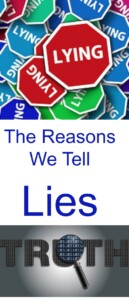The Reasons We Tell Lies
 The fisherman’s lie.
The fisherman’s lie.
There’s the well-known tale of the fisherman who comes back with a story of his great catch. He opens his arms to show how long the fish was – yet even as he is speaking, he is moving his arms further and further apart. The size of the fish grows with the telling of the tale.
Why does a fisherman exaggerate the size of the fish in his telling? Is it because he wants his fish to be the biggest one caught? Perhaps it’s because telling the actual size is embarrassing when he knows his friends have caught much bigger fish. Is it because he feels more manly having caught a bigger fish?
 The Why behind the Lies
The Why behind the Lies
What is it about us that causes us to exaggerate? What is in us that makes us want to twist a story just a little? Why do we take a small amount of truth and add to it a lot of untruth?
Truth is, this is part of our inheritance. We inherited this sin nature from our parents who obtained it from their parents . . . all the way back to Adam and Eve. The first lie took place in the Garden – Adam and Eve both deferred blame to someone else. Neither one was willing to admit the truth.
Scripture is full of admonition about telling lies. It’s strange how easy it is for others to see through our lies when we think they are concealed. Not only do adults recognize falsehood when they hear it, our kids do as well.
Part of our problem is that we’ve repeated lies to ourselves so often that we now truly consider them fact and truth. Another part of the problem is that we don’t really think telling a small, white lie is so bad. Yet the greatest part of the problem is that we are selfish people. We look out for number one. If telling a lie makes us look better, we find that it comes naturally and easily.
 The root problem of telling lies
The root problem of telling lies
The root problem is that we are selfish, and we have a case of pride. Who of us has ever told a lie in order to make us look worse than we are? Yep. That’s what I thought. It really does boil down to selfishness then, doesn’t it?
Sometimes we lie in order to stay out of trouble. Other times we lie because we want the other party to look worse than they are (and because doing so will make us look better). Occasionally, we don’t bother to get our facts straight before we give information. We are adults, yet we often act more like children in the tales we tell.
Lying is serious, deadly business. In the list of seven things the Lord hates, lying is in the runner up position. It can become a poisonous habit and be deadly not only to others, but to ourselves.
In the eyes of God, there is no such thing as a small white lie. A lie is a lie is a lie. Lying – no matter how big or how small – is an abomination and a sin to God.
The Fix for telling lies
There are some things we can do if we are caught in the lying trap.
- Name it. Lying is a sin. Admit that anything less than the whole truth is a lie. Stop making excuses.
- Confess lying as sin, and ask forgiveness from God and others to whom we have lied.
- Ask God for wisdom – and conviction – when the temptation comes to tell a lie, no matter how insignificant it may be.
- Make yourself accountable to someone you can trust. Give her permission to call you out if she hears you exaggerate or tell a lie. Ask her to touch base with you weekly to check your progress.
At the end of the day, a clear conscience is sweet. At the end of the day, there is satisfaction in looking back at our conversations, knowing that our tongue has been kept from evil, and our lips from speaking lies. We can know that God is pleased as well.







